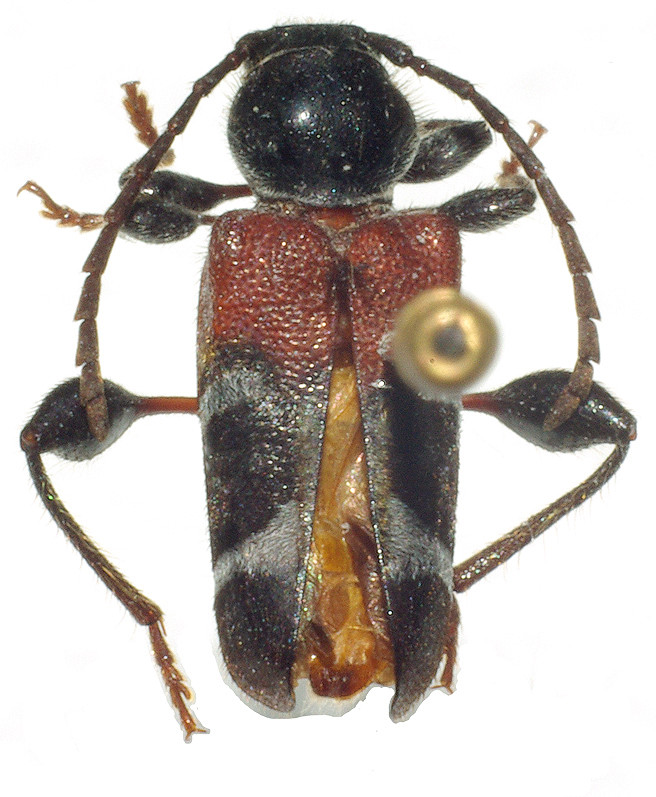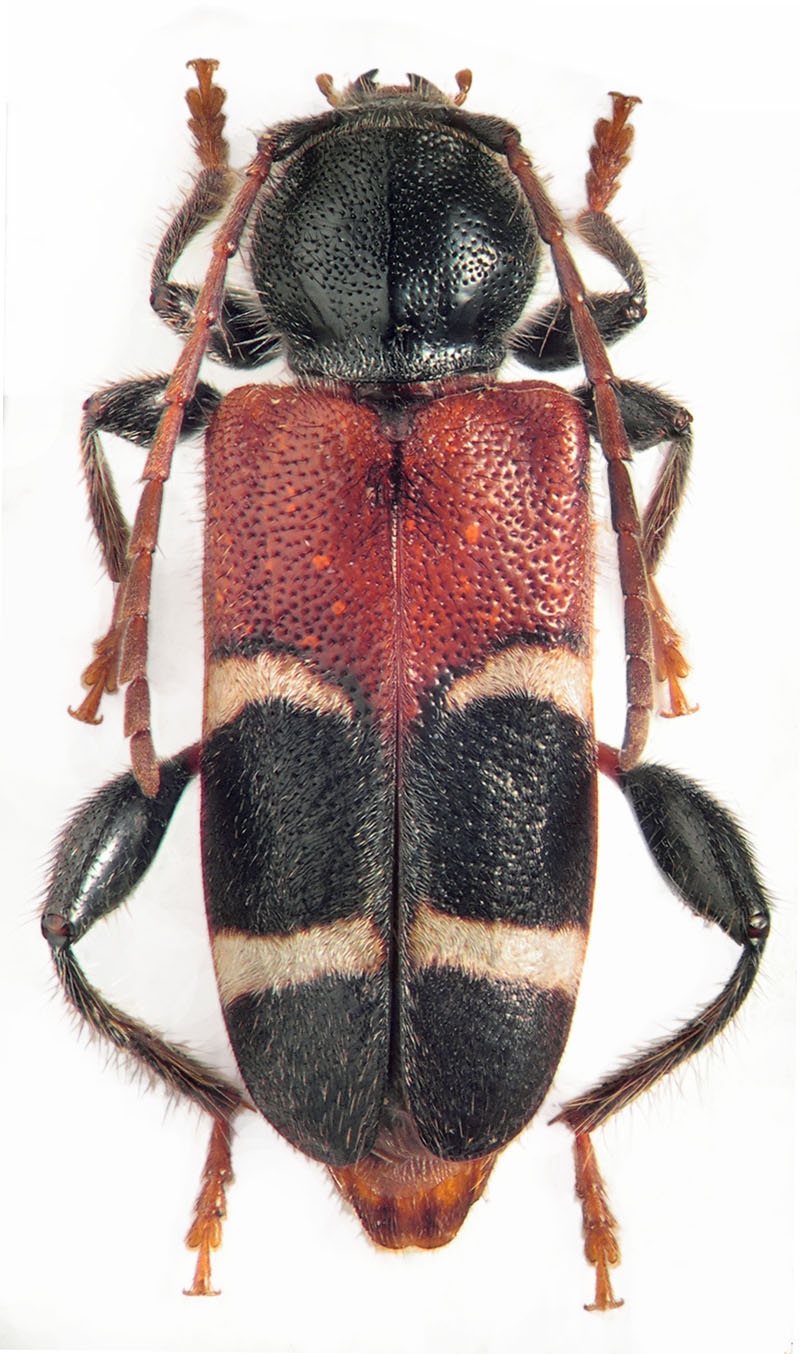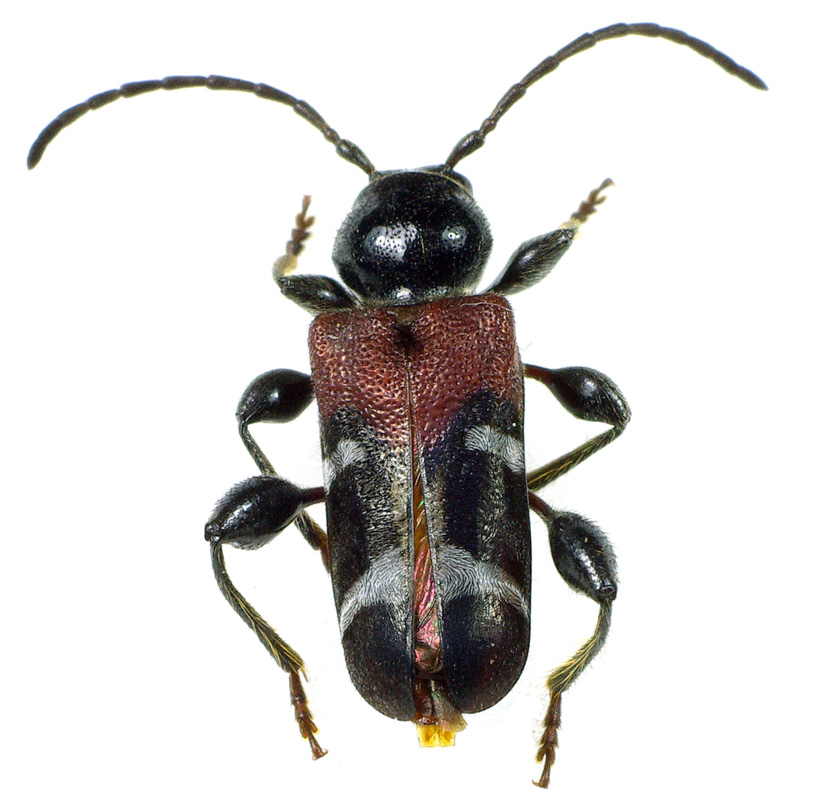| Author |
 Topic Topic  |
|
nalslan
Member Purpuricenus
 
China
324 Posts |
 Posted - 29/01/2013 : 14:21:45 Posted - 29/01/2013 : 14:21:45



|

Phymatodes maaki (maacki?)?
8mm, Guizhou, China.
Sorry for the bad shape of the creature.
AFAI, Phymatodes maaki is a species distributed in eastern Russia, Korea, Japan, maybe Northeaster China and Taiwan, but not southern China.
However, this is the closest one I can get (though shape of the second white strip on the elytra of this guy is a little different from the one I found on cerambycoidea.com).
Any comments? Thanks. |
Edited by - nalslan on 30/01/2013 02:20:34 |
|
|
Max
Member Rosalia
  
Russia
744 Posts |
 Posted - 29/01/2013 : 15:47:19 Posted - 29/01/2013 : 15:47:19



|

Why "Phytomades"? 
Phymatodes (Poecilium) maacki Kraatz, 1879
This species associated with grape, Vitis amurensis.
|
 |
|
|
Max
Member Rosalia
  
Russia
744 Posts |
 Posted - 29/01/2013 : 16:03:58 Posted - 29/01/2013 : 16:03:58



|
| By the way, exemplar from Guizhou is peculiar ratherish.. Versus russian beetles from mainland. |
 |
|
|
Francesco
Forum Admin
    
Luxembourg
9653 Posts |
|
|
Max
Member Rosalia
  
Russia
744 Posts |
 Posted - 29/01/2013 : 16:40:59 Posted - 29/01/2013 : 16:40:59



|
| I agree, objectively, if judge on picture. But I do not know true difference between them... |
 |
|
|
nalslan
Member Purpuricenus
 
China
324 Posts |
 Posted - 30/01/2013 : 02:38:43 Posted - 30/01/2013 : 02:38:43



|
Thank you all. My mind was out of focus last night due to staying late, and missed Phymatodes as Phytomades, or might have been affected the phyto- prefix too much.
I tried this beetle by Gressitt's key (1951). The first elytral white strip of P. savioi reaches elytral suture, and only the swelling part of hind femur is black. For my beetle, the first strip does not reach elytral suture and swelling parts of all femurs are black. So I excluded P. savioi for my specimen.
There is another species, P. semenovi Plavilstshikov 1935, which is native to Guizhou. But according to Gressitt's key, it belongs to subgenus Phymotodellus, not Poecillium.
Headache...
Anyway, thank you all again! |
Edited by - nalslan on 30/01/2013 02:41:40 |
 |
|
|
Francesco
Forum Admin
    
Luxembourg
9653 Posts |
 Posted - 30/01/2013 : 10:48:43 Posted - 30/01/2013 : 10:48:43




|
quote:
Originally posted by nalslan
Thank you all. My mind was out of focus last night due to staying late, and missed Phymatodes as Phytomades, or might have been affected the phyto- prefix too much.
No problem. Usually, I correct such errors, but yesterday the number of topic was too elevated.
By using Gressitt's key, I can only reach P. maaki, since the pattern is evidently white.
Nonetheless, we can detect several differences (shape of legs, colour of antennae, size of the basal red part of the elytra, etc.).
I have not got long series of maaki (it would be very nice if Max could send the picture of a pair    ), but if you does not find further Poecilium-species from China in BioLib or in Titan Base, we should conclude that it is about a new species... ), but if you does not find further Poecilium-species from China in BioLib or in Titan Base, we should conclude that it is about a new species... |
 |
|
|
Vitali
Member Rosenbergia
   
Estonia
1016 Posts |
 Posted - 30/01/2013 : 11:37:59 Posted - 30/01/2013 : 11:37:59



|
There is a remarkable feature that distinguishes P. maacki from the upper beetle. Chitin is white under the second white band, while the background is black under white pubescence in the upper beetle.
Such character works well for Xylotrechus rusticus and X. pantherinus. Can this be a good character also in Phymatodes? |
 |
|
|
Max
Member Rosalia
  
Russia
744 Posts |
 Posted - 30/01/2013 : 18:21:48 Posted - 30/01/2013 : 18:21:48



|

Female of Phymatodes maacki from Lazovsky district.
Shape of elytral stripes so variable.. But I'm never seen dilatation of stripe to suture |
 |
|
|
nalslan
Member Purpuricenus
 
China
324 Posts |
 Posted - 31/01/2013 : 02:30:51 Posted - 31/01/2013 : 02:30:51



|
Much thanks to you guys again!
Max's beetles and photo taking skill are amazing!! |
 |
|
|
Francesco
Forum Admin
    
Luxembourg
9653 Posts |
 Posted - 03/02/2013 : 09:35:19 Posted - 03/02/2013 : 09:35:19




|
I have noticed that Phymatodes (Poecilium) mizunumai Hayashi, 1974 is present in Taiwan.
I have no found pictures in the Web, but the book of Iconography describes is as "head, prothorax and antennae black";
There are two pictures as well, but not very clearly defined.
|
 |
|
|
nalslan
Member Purpuricenus
 
China
324 Posts |
 Posted - 06/02/2013 : 11:20:06 Posted - 06/02/2013 : 11:20:06



|
quote:
Originally posted by Francesco
I have noticed that Phymatodes (Poecilium) mizunumai Hayashi, 1974 is present in Taiwan.
I have no found pictures in the Web, but the book of Iconography describes is as "head, prothorax and antennae black";
There are two pictures as well, but not very clearly defined.
Francesco, thanks for pointing out that.
I grabbed my another book, Dr. Chou W. I.'s The Atlas of Taiwanese Cerambyciae 2nd Ed., there are 3 photos of P. (Poecilium) mizunumai (I am not sure whether it is appropriate to post his photos).
Their antennae are reddish brown, and their shapes of legs and 2nd white strips are different from my specimen too. |
Edited by - nalslan on 06/02/2013 11:20:44 |
 |
|
|
Francesco
Forum Admin
    
Luxembourg
9653 Posts |
 Posted - 06/02/2013 : 13:49:37 Posted - 06/02/2013 : 13:49:37




|
quote:
Originally posted by nalslan
I am not sure whether it is appropriate to post his photos.
It is better no.
Maybe your specimen really deserves a new name!  |
 |
|
|
nalslan
Member Purpuricenus
 
China
324 Posts |
 Posted - 24/04/2013 : 17:40:13 Posted - 24/04/2013 : 17:40:13



|
I was very lucky to get another one individual of this species (I caught only two in the field for a whole week from a location which is about 100km away, :(...another is a Phytoecia rufriventris). I think it is about time to consider seriously whether or not to get it a new name. 

150.44 KB
Too bad, the elytra are not closed seamlessly together again, maybe it is an evidence that these two guys are from a new species and this is trait for them to distinguish from others,  . . |
 |
|
|
Francesco
Forum Admin
    
Luxembourg
9653 Posts |
 Posted - 27/04/2013 : 13:39:43 Posted - 27/04/2013 : 13:39:43




|
quote:
Originally posted by nalslan
I think it is about time to consider seriously whether or not to get it a new name. 
Let's do it!
 |
 |
|
|
nalslan
Member Purpuricenus
 
China
324 Posts |
 Posted - 06/01/2014 : 15:31:27 Posted - 06/01/2014 : 15:31:27



|
Dear colleagues, this species was finally named as Phymatodes (Poecilium) latefasciatus n. sp.
You can find a pdf here:
Thank all of you, it would not be without the help of you. |
 |
|
 Topic Topic  |
|


